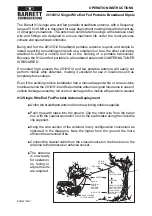
3
the crossover wires to provide at least
1
/
2
inch of clearance
between parts.
3. Set up the mast, then rotate it so the antenna’s shorter ele-
ments point toward the broadcast antennas of the stations
you want to receive.
ROUTING THE CABLE TO YOUR
TV/VCR/FM RECEIVER
If you use coaxial cable:
• Use plastic tape or mast standoff insulators to secure the
coaxial cable to the mast at about 3-foot intervals. Continue
down the roof and the side of the house using roof and wall
standoff insulators.
• Use coaxial cable nail-in clips every few feet to secure the
cable between the mast and where the cable enters the
house.
• Use a 75-ohm grounding block at the point where the coax-
ial cable enters the house. Read the Consumer Product
Safety Commission sheet for grounding instructions.
• Use a wall-through lead-in tube (not supplied) to neatly
route the coaxial cable through walls.
If you use twin-lead cable:
• Be sure the twin-lead cable remains at least 4 inches away
from all metal surfaces.
• Use standoff insulators about every 4 feet. Twist the twin-
lead cable about three turns between standoff insulators.
• Read the separate Consumer Product Safety Commission
sheet for grounding instructions.
CONNECTING TO YOUR TV/VCR AND FM RECEIVER
Connect the antenna’s lead-in cable to your TV/VCR and FM receiver’s antenna terminals according to the type of cable you used.
RadioShack carries a variety of splitters. Choose one that best suits your needs. Below are some sample connections.
Make connections as shown if you have:
• Coaxial antenna lead-in
• Twin-lead UHF terminals
• Coaxial VHF terminal
• Twin-lead FM antenna terminals
Make connections as shown if you have:
• Coaxial antenna lead-in
• Twin-lead UHF terminals
• Twin-lead VHF terminals
• Twin-lead FM antenna terminals
Crossover Wires
Mast
Toward TV
Stations’
Antennas
Main Boom Long Elements
Wing Boom Elements
Main Boom
Short Elements
RadioShack
Splitter with 75-Ohm Input
Cat. No. 15-1252
UHF
300 Ohm
VHF
75 Ohm
To FM
Receiver
Coaxial Lead-In
from Antenna
RadioShack
Transformer/Splitter
Cat. No. 15-1139
UHF
300 Ohm
VHF
300 Ohm
To FM
Receiver
Coaxial Lead-In
from Antenna
15-2156a.fm Page 3 Wednesday, April 26, 2000 7:47 PM






















